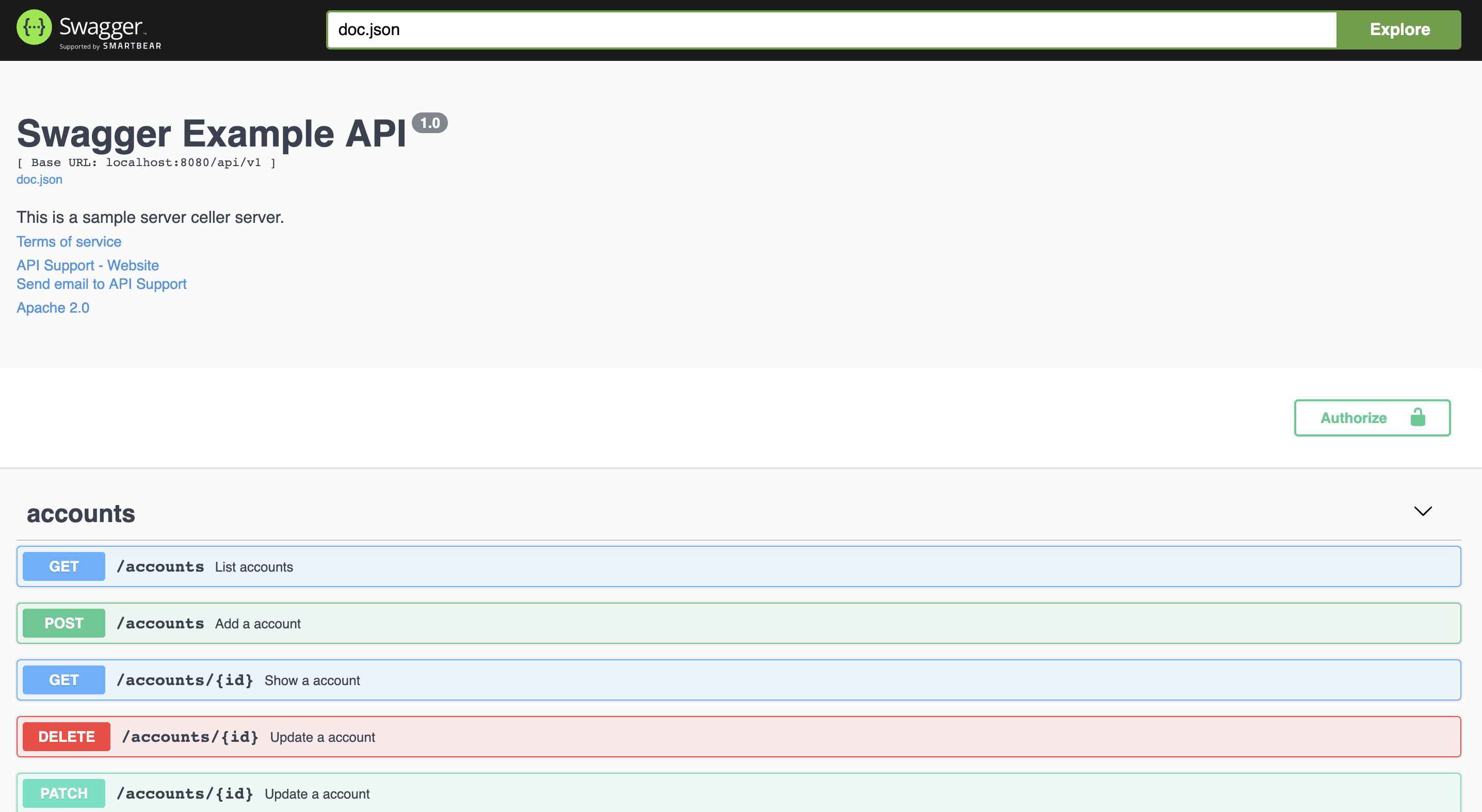 Documentation
¶
Documentation
¶
Overview ¶
Package swag converts Go annotations to Swagger Documentation 2.0. See https://github.com/swaggo/swag for more information about swag.
Index ¶
- Constants
- Variables
- func BuildCustomSchema(types []string) (*spec.Schema, error)
- func CheckSchemaType(typeName string) error
- func IsGolangPrimitiveType(typeName string) bool
- func IsNumericType(typeName string) bool
- func IsPrimitiveType(typeName string) bool
- func IsSimplePrimitiveType(typeName string) bool
- func PrimitiveSchema(refType string) *spec.Schema
- func ReadDoc(optionalName ...string) (string, error)
- func RefSchema(refType string) *spec.Schema
- func Register(name string, swagger Swagger)
- func SetCodeExampleFilesDirectory(directoryPath string) func(*Operation)
- func SetCodeExamplesDirectory(directoryPath string) func(*Parser)
- func SetDebugger(logger Debugger) func(parser *Parser)
- func SetExcludedDirsAndFiles(excludes string) func(*Parser)
- func SetFieldParserFactory(factory FieldParserFactory) func(parser *Parser)
- func SetMarkdownFileDirectory(directoryPath string) func(*Parser)
- func SetOverrides(overrides map[string]string) func(parser *Parser)
- func SetStrict(strict bool) func(*Parser)
- func TransToValidCollectionFormat(format string) string
- func TransToValidSchemeType(typeName string) string
- func TypeDocName(pkgName string, spec *ast.TypeSpec) string
- type AstFileInfo
- type Debugger
- type FieldParser
- type FieldParserFactory
- type Formater
- type Operation
- func (operation *Operation) AddResponse(code int, response *spec.Response)
- func (operation *Operation) DefaultResponse() *spec.Response
- func (operation *Operation) ParseAcceptComment(commentLine string) error
- func (operation *Operation) ParseCodeSample(attribute, _, lineRemainder string) error
- func (operation *Operation) ParseComment(comment string, astFile *ast.File) error
- func (operation *Operation) ParseDescriptionComment(lineRemainder string)
- func (operation *Operation) ParseEmptyResponseComment(commentLine string) error
- func (operation *Operation) ParseEmptyResponseOnly(commentLine string) error
- func (operation *Operation) ParseMetadata(attribute, lowerAttribute, lineRemainder string) error
- func (operation *Operation) ParseParamComment(commentLine string, astFile *ast.File) error
- func (operation *Operation) ParseProduceComment(commentLine string) error
- func (operation *Operation) ParseResponseComment(commentLine string, astFile *ast.File) error
- func (operation *Operation) ParseResponseHeaderComment(commentLine string, _ *ast.File) error
- func (operation *Operation) ParseRouterComment(commentLine string) error
- func (operation *Operation) ParseSecurityComment(commentLine string) error
- func (operation *Operation) ParseTagsComment(commentLine string)
- type PackageDefinitions
- type PackagesDefinitions
- type Parser
- func (parser *Parser) GetSchemaTypePath(schema *spec.Schema, depth int) []string
- func (parser *Parser) GetSwagger() *spec.Swagger
- func (parser *Parser) ParseAPI(searchDir string, mainAPIFile string, parseDepth int) error
- func (parser *Parser) ParseAPIMultiSearchDir(searchDirs []string, mainAPIFile string, parseDepth int) error
- func (parser *Parser) ParseAcceptComment(commentLine string) error
- func (parser *Parser) ParseDefinition(typeSpecDef *TypeSpecDef) (*Schema, error)
- func (parser *Parser) ParseGeneralAPIInfo(mainAPIFile string) error
- func (parser *Parser) ParseProduceComment(commentLine string) error
- func (parser *Parser) ParseRouterAPIInfo(fileName string, astFile *ast.File) error
- func (parser *Parser) Skip(path string, f os.FileInfo) error
- type RouteProperties
- type Schema
- type Swagger
- type TypeSpecDef
Constants ¶
const ( // CamelCase indicates using CamelCase strategy for struct field. CamelCase = "camelcase" // PascalCase indicates using PascalCase strategy for struct field. PascalCase = "pascalcase" // SnakeCase indicates using SnakeCase strategy for struct field. SnakeCase = "snakecase" )
const ( // ARRAY represent a array value. ARRAY = "array" // OBJECT represent a object value. OBJECT = "object" // PRIMITIVE represent a primitive value. PRIMITIVE = "primitive" // BOOLEAN represent a boolean value. BOOLEAN = "boolean" // INTEGER represent a integer value. INTEGER = "integer" // NUMBER represent a number value. NUMBER = "number" // STRING represent a string value. STRING = "string" // FUNC represent a function value. FUNC = "func" // ANY represent a any value. ANY = "any" // NIL represent a empty value. NIL = "nil" )
const Name = "swagger"
Name is a unique name be used to register swag instance.
const Version = "v1.7.8"
Version of swag.
Variables ¶
var ( // ErrRecursiveParseStruct recursively parsing struct. ErrRecursiveParseStruct = errors.New("recursively parsing struct") // ErrFuncTypeField field type is func. ErrFuncTypeField = errors.New("field type is func") // ErrFailedConvertPrimitiveType Failed to convert for swag to interpretable type. ErrFailedConvertPrimitiveType = errors.New("swag property: failed convert primitive type") // ErrSkippedField .swaggo specifies field should be skipped ErrSkippedField = errors.New("field is skipped by global overrides") )
Functions ¶
func BuildCustomSchema ¶ added in v1.7.7
BuildCustomSchema build custom schema specified by tag swaggertype.
func CheckSchemaType ¶ added in v1.1.1
CheckSchemaType checks if typeName is not a name of primitive type.
func IsGolangPrimitiveType ¶ added in v1.4.0
IsGolangPrimitiveType determine whether the type name is a golang primitive type.
func IsNumericType ¶ added in v1.7.7
IsNumericType determines whether the swagger type name is a numeric type.
func IsPrimitiveType ¶ added in v1.4.0
IsPrimitiveType determine whether the type name is a primitive type.
func IsSimplePrimitiveType ¶ added in v1.7.7
IsSimplePrimitiveType determine whether the type name is a simple primitive type.
func PrimitiveSchema ¶ added in v1.7.7
PrimitiveSchema build a primitive schema.
func ReadDoc ¶
ReadDoc reads swagger document. An optional name parameter can be passed to read a specific document. The default name is "swagger".
func SetCodeExampleFilesDirectory ¶ added in v1.7.7
SetCodeExampleFilesDirectory sets the directory to search for codeExamples.
func SetCodeExamplesDirectory ¶ added in v1.7.7
SetCodeExamplesDirectory sets the directory to search for code example files.
func SetDebugger ¶ added in v1.7.7
SetDebugger allows the use of user-defined implementations.
func SetExcludedDirsAndFiles ¶ added in v1.7.7
SetExcludedDirsAndFiles sets directories and files to be excluded when searching.
func SetFieldParserFactory ¶ added in v1.7.7
func SetFieldParserFactory(factory FieldParserFactory) func(parser *Parser)
SetFieldParserFactory allows the use of user-defined implementations.
func SetMarkdownFileDirectory ¶ added in v1.7.7
SetMarkdownFileDirectory sets the directory to search for markdown files.
func SetOverrides ¶ added in v1.7.7
SetOverrides allows the use of user-defined global type overrides.
func SetStrict ¶ added in v1.7.7
SetStrict sets whether swag should error or warn when it detects cases which are most likely user errors.
func TransToValidCollectionFormat ¶ added in v1.7.7
TransToValidCollectionFormat determine valid collection format.
func TransToValidSchemeType ¶ added in v1.1.1
TransToValidSchemeType indicates type will transfer golang basic type to swagger supported type.
Types ¶
type AstFileInfo ¶ added in v1.7.7
type AstFileInfo struct {
// File ast.File
File *ast.File
// Path the path of the ast.File
Path string
// PackagePath package import path of the ast.File
PackagePath string
}
AstFileInfo information of an ast.File.
type Debugger ¶ added in v1.7.7
type Debugger interface {
Printf(format string, v ...interface{})
}
Debugger is the interface that wraps the basic Printf method.
type FieldParser ¶ added in v1.7.7
type FieldParser interface {
ShouldSkip() (bool, error)
FieldName() (string, error)
CustomSchema() (*spec.Schema, error)
ComplementSchema(schema *spec.Schema) error
IsRequired() (bool, error)
}
FieldParser parse struct field
type FieldParserFactory ¶ added in v1.7.7
type FieldParserFactory func(ps *Parser, field *ast.Field) FieldParser
FieldParserFactory create FieldParser
type Formater ¶ added in v1.7.7
type Formater struct {
// contains filtered or unexported fields
}
Formater implements a formater for Go source files.
func (*Formater) FormatFile ¶ added in v1.7.7
FormatFile format the swag comment in go function.
func (*Formater) FormatMain ¶ added in v1.7.7
FormatMain format the main.go comment
type Operation ¶
type Operation struct {
spec.Operation
RouterProperties []RouteProperties
// contains filtered or unexported fields
}
Operation describes a single API operation on a path. For more information: https://github.com/swaggo/swag#api-operation
func NewOperation ¶
NewOperation creates a new Operation with default properties. map[int]Response.
func (*Operation) AddResponse ¶ added in v1.7.7
AddResponse add a response for a code.
func (*Operation) DefaultResponse ¶ added in v1.7.7
DefaultResponse return the default response member pointer.
func (*Operation) ParseAcceptComment ¶
ParseAcceptComment parses comment for given `accept` comment string.
func (*Operation) ParseCodeSample ¶ added in v1.7.7
ParseCodeSample godoc.
func (*Operation) ParseComment ¶
ParseComment parses comment for given comment string and returns error if error occurs.
func (*Operation) ParseDescriptionComment ¶ added in v1.7.7
ParseDescriptionComment godoc.
func (*Operation) ParseEmptyResponseComment ¶
ParseEmptyResponseComment parse only comment out status code and description,eg: @Success 200 "it's ok".
func (*Operation) ParseEmptyResponseOnly ¶ added in v1.4.0
ParseEmptyResponseOnly parse only comment out status code ,eg: @Success 200.
func (*Operation) ParseMetadata ¶ added in v1.7.7
ParseMetadata godoc.
func (*Operation) ParseParamComment ¶
ParseParamComment parses params return []string of param properties E.g. @Param queryText formData string true "The email for login"
[param name] [paramType] [data type] [is mandatory?] [Comment]
E.g. @Param some_id path int true "Some ID".
func (*Operation) ParseProduceComment ¶
ParseProduceComment parses comment for given `produce` comment string.
func (*Operation) ParseResponseComment ¶
ParseResponseComment parses comment for given `response` comment string.
func (*Operation) ParseResponseHeaderComment ¶ added in v1.7.7
ParseResponseHeaderComment parses comment for given `response header` comment string.
func (*Operation) ParseRouterComment ¶
ParseRouterComment parses comment for given `router` comment string.
func (*Operation) ParseSecurityComment ¶ added in v1.3.2
ParseSecurityComment parses comment for given `security` comment string.
func (*Operation) ParseTagsComment ¶ added in v1.1.0
ParseTagsComment parses comment for given `tag` comment string.
type PackageDefinitions ¶ added in v1.7.7
type PackageDefinitions struct {
// files in this package, map key is file's relative path starting package path
Files map[string]*ast.File
// definitions in this package, map key is typeName
TypeDefinitions map[string]*TypeSpecDef
// package name
Name string
}
PackageDefinitions files and definition in a package.
type PackagesDefinitions ¶ added in v1.7.7
type PackagesDefinitions struct {
// contains filtered or unexported fields
}
PackagesDefinitions map[package import path]*PackageDefinitions.
func NewPackagesDefinitions ¶ added in v1.7.7
func NewPackagesDefinitions() *PackagesDefinitions
NewPackagesDefinitions create object PackagesDefinitions.
func (*PackagesDefinitions) CollectAstFile ¶ added in v1.7.7
func (pkgs *PackagesDefinitions) CollectAstFile(packageDir, path string, astFile *ast.File) error
CollectAstFile collect ast.file.
func (*PackagesDefinitions) FindTypeSpec ¶ added in v1.7.7
func (pkgs *PackagesDefinitions) FindTypeSpec(typeName string, file *ast.File, parseDependency bool) *TypeSpecDef
FindTypeSpec finds out TypeSpecDef of a type by typeName @typeName the name of the target type, if it starts with a package name, find its own package path from imports on top of @file @file the ast.file in which @typeName is used @pkgPath the package path of @file.
func (*PackagesDefinitions) ParseTypes ¶ added in v1.7.7
func (pkgs *PackagesDefinitions) ParseTypes() (map[*TypeSpecDef]*Schema, error)
ParseTypes parse types @Return parsed definitions.
type Parser ¶
type Parser struct {
// PropNamingStrategy naming strategy
PropNamingStrategy string
// ParseVendor parse vendor folder
ParseVendor bool
// ParseDependencies whether swag should be parse outside dependency folder
ParseDependency bool
// ParseInternal whether swag should parse internal packages
ParseInternal bool
// Strict whether swag should error or warn when it detects cases which are most likely user errors
Strict bool
// Overrides allows global replacements of types. A blank replacement will be skipped.
Overrides map[string]string
// contains filtered or unexported fields
}
Parser implements a parser for Go source files.
func (*Parser) GetSchemaTypePath ¶ added in v1.7.7
GetSchemaTypePath get path of schema type.
func (*Parser) GetSwagger ¶
GetSwagger returns *spec.Swagger which is the root document object for the API specification.
func (*Parser) ParseAPI ¶ added in v1.3.2
ParseAPI parses general api info for given searchDir and mainAPIFile.
func (*Parser) ParseAPIMultiSearchDir ¶ added in v1.7.7
func (parser *Parser) ParseAPIMultiSearchDir(searchDirs []string, mainAPIFile string, parseDepth int) error
ParseAPIMultiSearchDir is like ParseAPI but for multiple search dirs.
func (*Parser) ParseAcceptComment ¶ added in v1.7.7
ParseAcceptComment parses comment for given `accept` comment string.
func (*Parser) ParseDefinition ¶ added in v1.1.1
func (parser *Parser) ParseDefinition(typeSpecDef *TypeSpecDef) (*Schema, error)
ParseDefinition parses given type spec that corresponds to the type under given name and package, and populates swagger schema definitions registry with a schema for the given type
func (*Parser) ParseGeneralAPIInfo ¶ added in v1.3.2
ParseGeneralAPIInfo parses general api info for given mainAPIFile path.
func (*Parser) ParseProduceComment ¶ added in v1.7.7
ParseProduceComment parses comment for given `produce` comment string.
func (*Parser) ParseRouterAPIInfo ¶ added in v1.3.2
ParseRouterAPIInfo parses router api info for given astFile.
type RouteProperties ¶ added in v1.7.7
RouteProperties describes HTTP properties of a single router comment.
type Schema ¶ added in v1.7.7
type Schema struct {
*spec.Schema //
PkgPath string // package import path used to rename Name of a definition int case of conflict
Name string // Name in definitions
}
Schema parsed schema.
type Swagger ¶
type Swagger interface {
ReadDoc() string
}
Swagger is an interface to read swagger document.
type TypeSpecDef ¶ added in v1.7.7
type TypeSpecDef struct {
// ast file where TypeSpec is
File *ast.File
// the TypeSpec of this type definition
TypeSpec *ast.TypeSpec
// path of package starting from under ${GOPATH}/src or from module path in go.mod
PkgPath string
}
TypeSpecDef the whole information of a typeSpec.
func (*TypeSpecDef) FullName ¶ added in v1.7.7
func (t *TypeSpecDef) FullName() string
FullName full name of the typeSpec.
func (*TypeSpecDef) FullPath ¶ added in v1.7.7
func (t *TypeSpecDef) FullPath() string
FullPath of the typeSpec.
func (*TypeSpecDef) Name ¶ added in v1.7.7
func (t *TypeSpecDef) Name() string
Name the name of the typeSpec.



